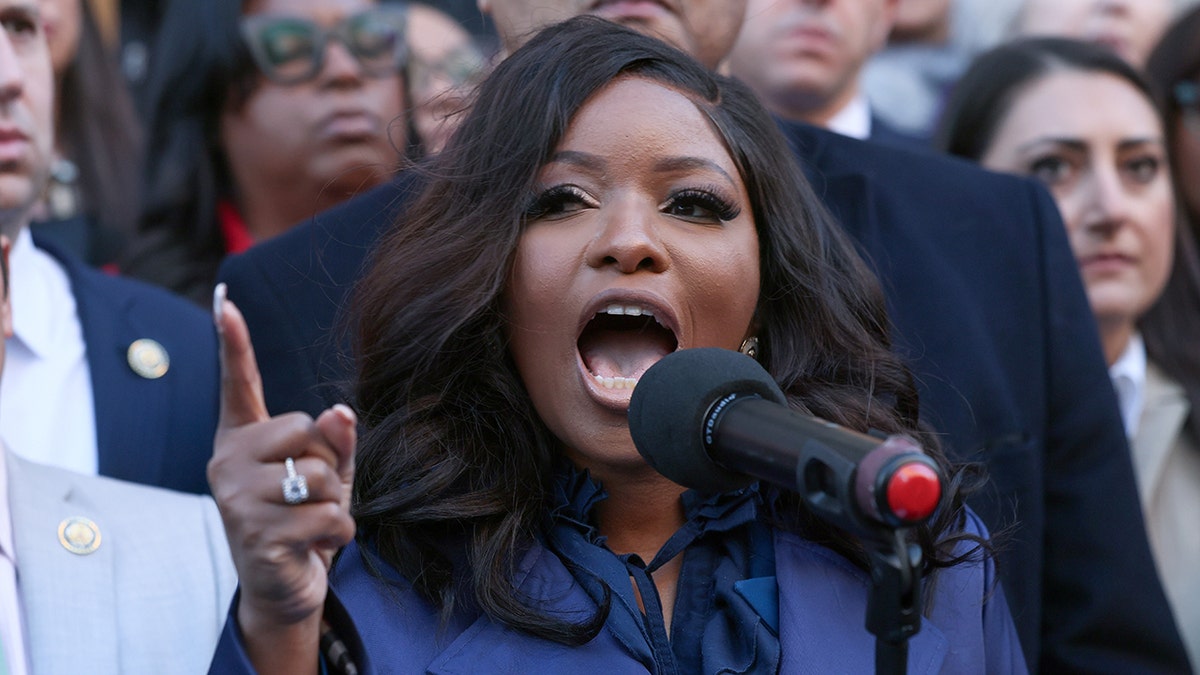In a recent House Judiciary hearing, Representative Jasmine Crockett confronted witnesses regarding their roles and the implications of their legal practices, particularly in relation to former President Donald Trump. The session illuminated the contentious dynamics surrounding legal accountability and political maneuvering.

Crockett initiated her questioning by referencing a list of lawyers previously associated with Trump, including notable figures like Rudy Giuliani and Jenna Ellis. She pointed out that many of these attorneys faced disciplinary actions, raising questions about the caliber of legal representation Trump has employed. Her pointed inquiry aimed to highlight the troubling patterns among Trump’s legal team, suggesting that their track records reflect poorly on their obligations as lawyers.
As the exchange progressed, Crockett turned her focus to the concept of a “two-tiered” legal system, questioning the witnesses about their experiences with defendants facing numerous charges. She asked whether they had ever encountered a defendant with over 80 charges in multiple jurisdictions who was not held pre-trial. The witnesses, while attempting to provide context, struggled to offer direct answers, which only intensified the scrutiny from Crockett.
Crockett’s questions also delved into the topic of gag orders and witness intimidation. She pressed the witnesses on whether they had seen defendants violate gag orders without facing immediate consequences. Her inquiries underscored a perceived inconsistency in how legal procedures are applied, particularly when it comes to high-profile cases involving Trump.
The discussion then shifted to Mr. Hamilton, the executive director of America First Legal, a group involved in shaping conservative policies for future administrations. Crockett highlighted the organization’s controversial mandate outlined in Project 2025, which includes proposals that many view as authoritarian, such as deploying military forces for domestic law enforcement and eliminating federal agencies like the Department of Education.
Crockett expressed deep concern about the implications of such policies, framing them as a potential pathway to authoritarianism. She criticized the project’s goals, arguing that they undermine democratic principles and could lead to a chilling effect on civil rights. Her remarks painted a stark picture of what she termed a “playbook for a future dictatorship,” emphasizing the need for vigilance in protecting democratic institutions.
The dynamic became more heated as Crockett emphasized the need for accountability within the legal system. She reiterated that no one is indicted without substantial evidence reviewed by a grand jury, underscoring that any future convictions of Trump would be determined by a jury of his peers, not by political rhetoric.
During this intense dialogue, tensions flared further when another representative, from Wyoming, raised concerns about conflicts of interest among committee members, particularly targeting Mr. Goldman from New York. This accusation added another layer of complexity to the proceedings, as it blurred the lines between legal and political accountability.

The hearing highlighted the broader implications of Trump’s legal challenges and the polarized environment surrounding them. Crockett’s assertive questioning and the subsequent responses from the witnesses encapsulated the ongoing struggle between legal integrity and political maneuvering. As the hearing progressed, it became clear that the issues at hand extend beyond individual cases, reflecting a larger narrative about the intersection of law and politics in contemporary America.
In conclusion, the House Judiciary hearing served as a microcosm of the current political climate, illustrating the contentious debates over legal accountability, the role of attorneys, and the potential ramifications of proposed conservative policies. Representative Jasmine Crockett’s fervent questioning underscored the urgency of these discussions, as the nation grapples with the implications of leadership, legal ethics, and the preservation of democratic values.
